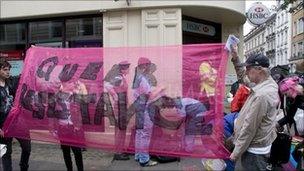London HIV services cut as infections rise
- Published
London's HIV prevention groups have said they are "concerned" and "outraged" at a 20% funding cut.
London Primary Care Trust (PCT) chief executives have cut the budget for 2011-12 by £516,000.
Meanwhile, the number of Londoners with HIV who acquired the infection in the UK has more than doubled in the past decade, latest figures show.
The PCT said it wanted resources to be targeted "more effectively".
Latest figures show the number of people in London diagnosed with HIV acquired in the UK has increased from 660 in 2001 to 1,480 in 2010, according to the Health Protection Agency (HPA).
Dr Paul Crook, the HPA's epidemiologist for London, said: "The HIV epidemic in London continues to present a major public health problem."
In the capital, 28,000 people are living with HIV. This is about one in every 200 Londoners aged between 15 and 59 - a rate three times higher than any other region in England.
'Ludicrous' cuts
Dr Yusef Azad, director of policy and campaigns at the National Aids Trust, said he was "concerned" about the cuts.
"Every year new people become sexually active who haven't heard the safe sex messages.
"We constantly need to renew our safe sex messages, and if we don't have the resources to do that, it's a real problem."
Francis Kaikumba, head of the African Health Policy Network, which promotes HIV prevention among high-risk African communities, said: "Our work is crucial in preventing the disease."
Mark Creelman, from the Inner North West London PCT, which manages the Pan London HIV Prevention Programme, said it was "undertaking a comprehensive needs assessment and evaluation".
"The results of the needs assessment and evidence-based evaluation will inform commissioners, enabling them in the future to target their resources more effectively," he added.
One in 10 gay men in London has the virus, according HIV prevention charity the Terrence Higgins Trust (THT).
Mark Delacour, from the Lesbian, Gay, Bisexual and Transgender Consortium, which represents gay support groups, described the decision to make cuts as "outrageous".
Late diagnosis
"It is ludicrous to cut HIV prevention and a very short-sighted decision," he said.
"It will cost more in the long term."

The Queer Resistance campaign group protested against planned cuts in London over the weekend
The HPA has said that preventing HIV infections which were diagnosed in London in 2008 would have saved £480m.
It has estimated that the lifetime treatment costs for someone diagnosed with HIV is £320,000.
It has also estimated a quarter of people living with HIV in London remain undiagnosed and half of people are diagnosed too "late" for effective treatment to be carried out.
"The stigma attached to having HIV means people aren't coming forward for testing," Dr Crook said.
There are also claims that some HIV prevention charities are not spending their money effectively.
Peter Scott, of HIV prevention group Status, said: "The response to the HIV epidemic in the capital is an utter shambles.
"After 25 years of the epidemic in London, there is no evidence the great majority of what has been purchased with the prevention budget has had any effect on reducing HIV infections.
"The major charities in the field have fiddled around the edges and not confronted the major problem - that sex without condoms is increasing.
"Cuts are a wake-up call. We need a complete review."
Meanwhile, Lisa Power, Policy Director at THT, warned: "Campaigns that frighten, turn people off.
"Now we're telling people: 'It's to your benefit to get tested.'
"If you have HIV, finding out can be the best present you can give yourself.
"By getting clinical support and good treatment, you could live into your 70s."
- Published1 December 2010
- Published26 November 2010
- Published26 November 2010
- Published7 October 2010